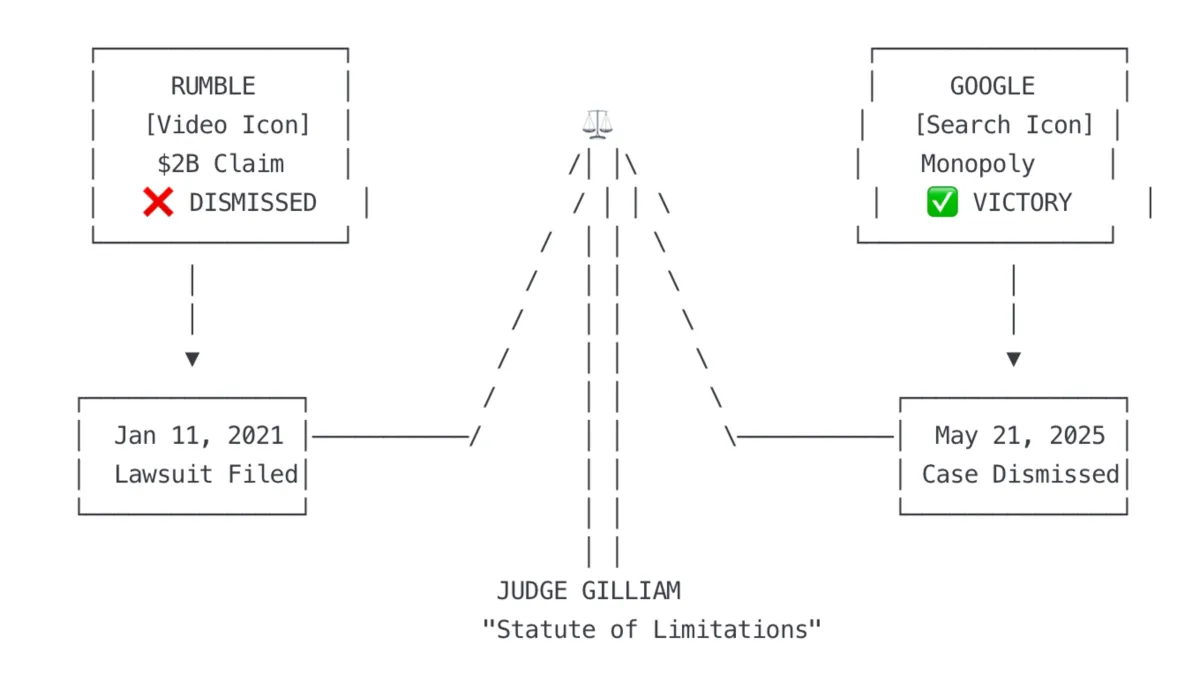
A federal judge dismissed Rumble's $2 billion antitrust lawsuit against Google this week, marking the end of a four-year legal battle that accused the tech giant of monopolizing the online video-sharing market through anticompetitive practices.
Get the PPC Land newsletter ✉️ for more like this
U.S. District Judge Haywood Gilliam Jr. ruled on May 21, 2025, that Rumble's 2021 lawsuit seeking more than $2 billion in damages was untimely filed outside the four-year statute of limitations for antitrust claims. The decision effectively terminated the case before reaching trial, which had been scheduled for July 2025.
The Canadian video platform filed its complaint on January 11, 2021, alleging that Google rigged search algorithms to favor YouTube over competing video platforms and forced Android device manufacturers to preinstall YouTube apps. According to the court documents, Rumble is unique among video-sharing platforms in that it has an extensive catalog of exclusively-assigned original content videos, thus differentiating itself from other video-sharing platforms.
Court's key findings on timing
The court determined that Rumble's claims accrued in April 2014, when the company alleged it first suffered anticompetitive harm from Google's conduct. Under federal antitrust law, claims must be filed within four years of when the injury occurs, making Rumble's 2021 filing approximately three years too late.
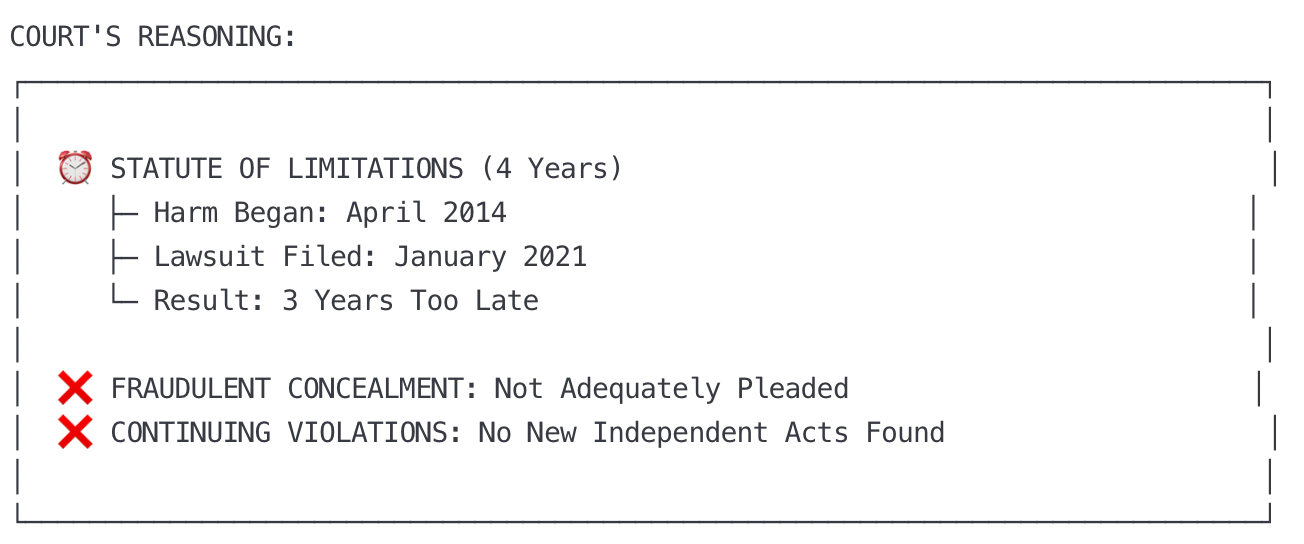
Rumble reasonably believes that its damages as will be proven at trial will greatly exceed $2,000,000,000, before trebling or attorney fees and costs, the company stated in its original complaint. The lawsuit sought treble damages, which could have reached $6 billion if successful.
Judge Gilliam rejected two key arguments Rumble advanced to extend the limitations period. First, the court found that Rumble failed to adequately plead fraudulent concealment by Google, noting that the mere fact that the production of records may lead to a litigant's embarrassment, incrimination, or exposure to further litigation will not, without more, compel the court to seal its records.
Second, the court dismissed Rumble's continuing violations theory, which argued that Google's ongoing anticompetitive conduct restarted the limitations clock. The judge found that Rumble failed to identify specific "new and independent acts" that would constitute fresh violations during the statutory period.
Technical details of alleged monopolization
Rumble's complaint centered on two primary allegations. The first claimed Google manipulated search algorithms to ensure YouTube videos appeared first in search results, even when users specifically searched for content on Rumble. When choosing the best video clips to promote from around the web, Alphabet Inc.'s Google gives a secret advantage to one source in particular: itself, according to reporting by The Wall Street Journal that Rumble cited in its filings.
The lawsuit included detailed screenshots demonstrating how Google allegedly prioritized YouTube results. In one example, Rumble claimed it released a video titled "Baby preciously cuddles cat for nap time" to other platforms before YouTube, yet YouTube was preferenced by Google's search engine such that YouTube was the first result in search results.
The second allegation involved Google's Android contracts. Rumble argued that Google uses preinstallation agreements— MADAs— to ensure that its entire suite of search-related products is given premium placement on Android GMS devices. These Mobile Application Distribution Agreements allegedly required device manufacturers to bundle YouTube with other Google apps.
Related Stories
- Google found guilty of ad tech monopoly: What's next? - April 21, 2025
- DOJ wins antitrust fight against Google - April 18, 2025
- Google battles DOJ over "sweeping remedies" as antitrust case enters critical phase - April 21, 2025
- Google faces potential breakup as remedies phase begins - May 2025
- Google to appeal Antitrust Ruling in Search Market monopolization case - August 5, 2024
Financial impact claims
Rumble presented extensive financial data to support its damage calculations. The company stated that Rumble Videos for which Rumble is the original source and exclusive rights holder have received more than 9.3 Billion views globally through YouTube, for which Rumble has received revenue from Google in the amount of $4,345,883.76.
This translated to approximately $0.48 per thousand views on YouTube, compared to Gross CPM is approximately $20/CPM, globally for views on Rumble's own platform. The stark difference formed the basis of Rumble's lost revenue calculations.
The company argued that Google's alleged misconduct prevented it from developing the scale necessary to compete effectively. Since 2013, Google search traffic accounted for only roughly 12 million users on Rumble out of the 375 million reported by Google Analytics, while Facebook traffic brought 215 million users during the same period.
Industry context
The case highlighted the challenges facing independent video platforms in competing with YouTube's dominance. It has been reported that Google's (i.e., YouTube's) share of the relevant market is now greater than 75%, according to Rumble's filings.
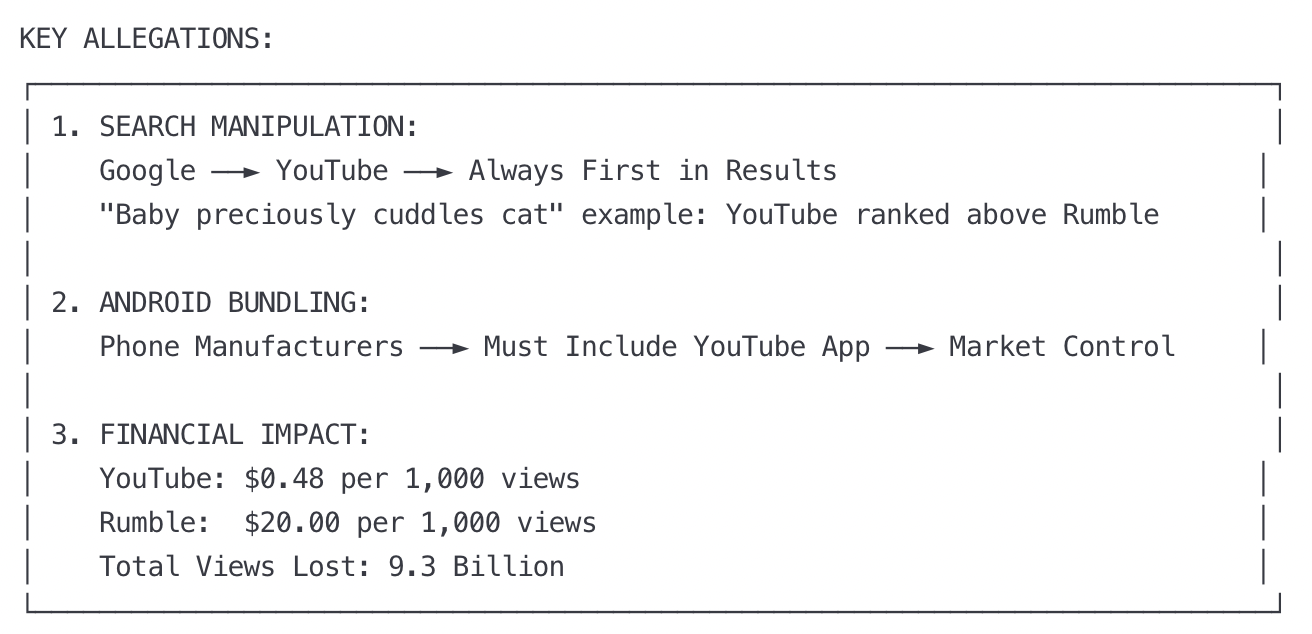
During court proceedings in February 2025, Google's attorney revealed that roughly less than 1% of views on YouTube come from people who click on [search] links. This statistic challenged Rumble's central claim that search result placement significantly affected video traffic distribution.
The legal team representing Rumble included high-profile litigator David Boies, who joined the case in May 2024. Video sharing platform Rumble is adding famed litigator David Boies to its trial team in a federal lawsuit accusing Alphabet's Google of suppressing online video competition. Boies gained prominence representing the U.S. government in its 1990s antitrust case against Microsoft.
 PPC LandLuis Rijo
PPC LandLuis Rijo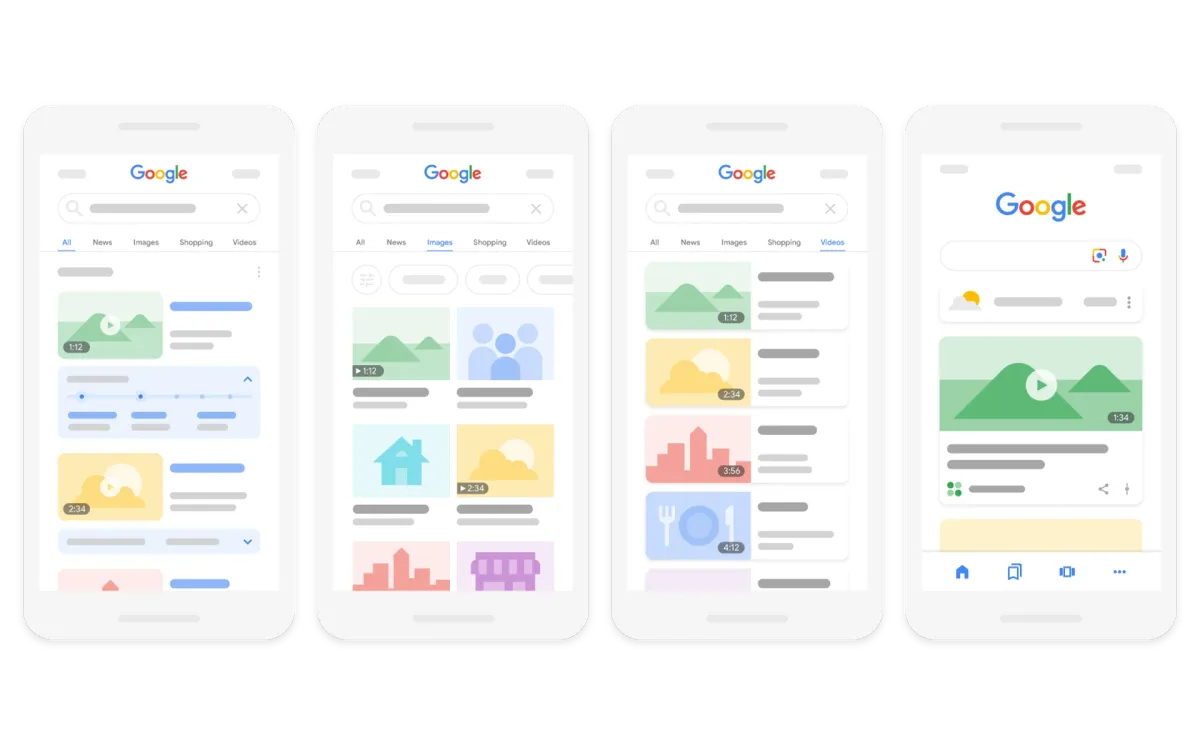
Parallel litigation continues
The dismissal affects only Rumble's first lawsuit against Google. The video platform filed a separate $1 billion antitrust suit in May 2024, targeting Google's digital advertising practices specifically. This is the second lawsuit filed by Rumble against Google, with the first accusing the search engine operator of favoring itself and another of its properties – YouTube – in its search results.
That second case remains in active discovery and addresses different allegations related to Google's ad tech monopolization across the "ad tech stack" of buying, selling, and exchanging digital advertisements.
Get the PPC Land newsletter ✉️ for more like this
Why this matters
The court's decision demonstrates the practical challenges facing companies attempting to challenge tech giants through antitrust litigation. The four-year statute of limitations creates a narrow window for filing claims, particularly when alleged anticompetitive conduct may take years to fully manifest its market effects.
Marketing professionals should note that despite this legal setback, regulatory scrutiny of Google continues across multiple fronts. The Department of Justice recently won a separate antitrust case against Google's search practices, and another case targeting Google's ad tech business is proceeding through federal court.
The Rumble decision also highlights the importance of contemporaneous documentation of potential antitrust violations. Companies suspecting anticompetitive harm must act quickly to preserve their legal options within statutory deadlines.
The dismissal may encourage other platforms to pursue alternative strategies for competing with dominant players, including technological innovation, strategic partnerships, or seeking regulatory intervention rather than lengthy court battles.
Timeline
January 11, 2021: Rumble files initial antitrust complaint against Google seeking $2 billion in damages
July 2022: Federal court denies Google's motion to dismiss, allowing case to proceed
May 2024: Rumble adds David Boies to legal team ahead of scheduled trial
May 2024: Rumble files separate $1 billion lawsuit targeting Google's ad tech practices
October 2024: Google files motion for summary judgment
February 2025: Court hearing reveals less than 1% of YouTube views come from Google search
May 21, 2025: Judge Gilliam grants Google's summary judgment motion, dismissing case on statute of limitations grounds

